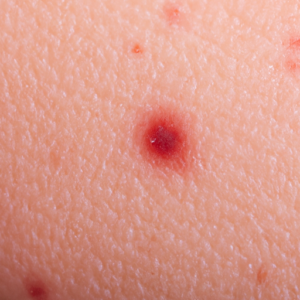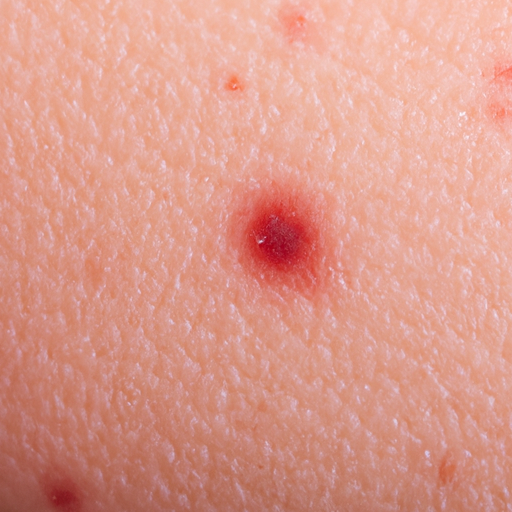Let’s Talk about Chicken Pox: The Itchy Rash that Affects Everyone
Hey there, have you ever heard of chicken pox? It’s a viral infection that is quite common among children. The virus responsible for the infection is called varicella-zoster virus, and it spreads easily from one person to another through coughs and sneezes or touching the fluid from the blisters. The disease is mostly known for its itchy rash that spreads all over the body. If you want to know more about chicken pox, be sure to check out this article (source).
What Causes Chicken Pox?
Well, folks, let’s get right down to the nitty-gritty – how do you actually get chicken pox? Simply put, it’s a highly contagious viral infection that’s spread from person to person through the air or direct contact with blisters. That’s right, those pesky little blisters on your skin are like tiny, infected droplets just waiting to infect the next person unlucky enough to be in their path. But don’t worry, you won’t catch it from touching the same doorknob as someone who has chicken pox – the virus can only live for a short time on surfaces. When someone who has chicken pox coughs or sneezes, the virus is released into the air and can be inhaled by anyone nearby. Likewise, if you come into contact with the fluid inside a chicken pox blister, that virus can infect you too. It’s important to remember that you can actually spread the virus to others before you even have symptoms, so you might not even know you’re contagious until it’s too late. So, how do you avoid catching chicken pox? In short, you can’t always avoid it – but there are steps you can take to minimize your risk. If you’ve never had chicken pox, getting vaccinated is the best way to protect yourself. Otherwise, try to avoid close contact with sick individuals, and wash your hands frequently, especially if you’ve been in contact with someone who has the virus. Stay safe out there, folks!
Do I have Chicken Pox? Here are the Symptoms you Need to Know!
If you have chicken pox, you might experience a variety of symptoms. Most people know the first sign as the telltale rash that spreads all over their body, but there are other symptoms to watch out for.
The most common symptom of chicken pox is the rash, which starts out as red bumps that resemble insect bites. These bumps eventually turn into small, fluid-filled blisters that break open and crust over. Other symptoms may include a fever, headache, fatigue, and loss of appetite. The rash and other symptoms typically last about 7-10 days.
One thing to keep in mind is that some people may experience more severe symptoms than others, especially adults. Complications from chicken pox may include pneumonia, encephalitis, and dehydration. It’s important to seek medical attention if you have any concerns about your symptoms.
If you’re experiencing symptoms of chicken pox, it’s important to stay home from school or work until you’ve fully recovered. Chicken pox is highly contagious and can be spread through direct contact with infected blisters.

Of course, prevention is always the best course of action. If you haven’t been vaccinated for chicken pox, talk to your doctor about getting the vaccine. It’s also a good idea to practice good hygiene, such as washing your hands frequently and avoiding close contact with people who are sick.
Remember, if you think you may have chicken pox, it’s important to take the necessary precautions to prevent spreading the virus and seek medical attention if needed.
How to Confirm You Have Chicken Pox: Diagnosing Chicken Pox
So, you’ve noticed a rash and suspect that you have chicken pox? It’s important to get a proper diagnosis from a healthcare professional, who will determine whether it is indeed chicken pox or another viral infection.
The diagnosis of chicken pox is usually made based on the appearance of the rash. The telltale sign of chicken pox is a rash that starts on the trunk and spreads to other parts of the body. The rash begins as small red bumps that turn into blisters filled with fluid, which then scab over and heal up within a week or two.
Your doctor may also look for other symptoms that are commonly associated with chicken pox, such as fever, headache, sore throat, and fatigue. In some cases, they may recommend laboratory testing, such as blood tests or viral cultures, to confirm the diagnosis.
It’s important to note that chicken pox can be mistaken for other conditions, such as insect bites, hives, or even shingles, which is caused by the same virus that causes chicken pox. Therefore, it’s essential to seek medical attention if you suspect you have chicken pox.
If you have been vaccinated against chicken pox, your symptoms may be milder, and your healthcare provider may need to conduct further testing to rule out other viral infections or allergies that may cause similar symptoms.
The most important thing to remember is that early diagnosis and treatment can help prevent the spread of chicken pox to others, reduce the risk of complications, and speed up the healing process. So, if you suspect you have chicken pox, be sure to seek medical attention as soon as possible.
Tackling Chicken Pox: Getting Better with Medications and Home Remedies
So, you’ve got chicken pox. It’s not fun and games, but it doesn’t have to be all gloom and doom either. There are some medications and home remedies that can help you feel better while you wait for your body to fight off the virus.
First things first, it’s important to drink plenty of fluids to prevent dehydration. Chicken pox can make you lose a lot of fluids from your body, and you need to replenish them. You can drink water, coconut water, herbal tea, fruit juice, or any other fluid that you like.
For the itching, which is one of the most irritating symptoms of chicken pox, you can use over-the-counter creams and lotions, such as calamine lotion, which can cool down the skin and reduce the itchiness. You can also take oatmeal baths or apply a wet compress to the affected areas to soothe the skin.
If you have a fever or pain, your doctor may prescribe acetaminophen (paracetamol) or ibuprofen to bring down your temperature and alleviate the discomfort. Aspirin should be avoided in children, as it may cause a rare but serious condition called Reye’s syndrome.
Antiviral medications, such as acyclovir, may be prescribed to people who are at high risk of complications from chicken pox, such as pregnant women, newborn babies, or people with weakened immune systems. These medications work by stopping the virus from reproducing in the body, but they are most effective when started early in the infection.
Aside from these treatments, it’s important to get plenty of rest and avoid scratching the rash, as this can increase the risk of infection and scarring. If you have any concerns or questions about your condition or treatment, don’t hesitate to consult your doctor.
Preventing a Nasty Chicken Pox Infection
Well, let me tell you folks, there ain’t nothing worse than getting chicken pox. Lucky for you, there are ways to prevent the virus from infecting you in the first place. The best way to avoid chicken pox is to get the varicella vaccine. It may not completely prevent the virus, but it will make the symptoms much milder if you do get it.
Another way to avoid getting chicken pox is to stay away from infected folks. If you know someone who has the virus, keep your distance and avoid sharing anything with them like drinks or utensils. Also, wash your hands frequently with soap and water to help keep the virus from spreading.
If you do end up getting chicken pox, there are things you can do to prevent it from spreading to others. Stay home from work or school until all of your blisters have scabbed over. Keep the infected area clean and avoid itching the rash. It’s also a good idea to wear loose clothing to help keep the rash from getting irritated.
Remember, folks, prevention is key when it comes to chicken pox. So, get vaccinated or avoid close contact with infected people and wash those hands! Trust me, you don’t want to deal with itchy blisters all over your body for weeks on end.
My Final Thoughts and Advice on Chicken Pox
Well, that’s everything I’ve learned about chicken pox! To summarize, chicken pox is a highly contagious viral infection that causes a telltale rash and other symptoms. It’s spread through direct contact with an infected person’s blisters or through the air when they cough or sneeze.
If you suspect you have chicken pox, it’s important to see a doctor to confirm the diagnosis. They will likely prescribe antiviral medication to help manage your symptoms and prevent complications. You can also try at-home remedies like oatmeal baths, cold compresses, and over-the-counter pain relievers.
Prevention is key, so I highly recommend getting vaccinated if you haven’t already. There are also other measures you can take to avoid infection, like washing your hands frequently, avoiding close contact with infected individuals, and covering your mouth and nose when you cough or sneeze.
Overall, while chicken pox can be uncomfortable and even dangerous in some cases, there are many ways to manage and prevent complications. By staying informed and taking the necessary precautions, you can protect yourself and your loved ones from this pesky virus.
